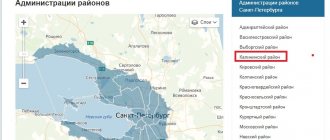What prompted me to take on this matter was a feeling of blatant injustice. A large family (four children, the eldest 12 years old) lives in a rented apartment; in 2021 they purchased an eight-meter room in a communal apartment for the sake of permanent registration at the place of residence (living on 8 meters for six of them would somehow not be enough).
The family’s attempts to register as those in need of housing did not lead to anything; in 2021, the district administration refused to register. Knowing the judicial practice in such cases, I twice refused to take on this case, but having learned about two unsuccessful attempts to file a lawsuit (due to the fault of hired lawyers), I felt how much this woman had suffered and how much she needed my help.
Registration of citizens as those in need of residential premises
In each region, this issue is regulated by a special regional law. The region was St. Petersburg, therefore the Law of St. Petersburg dated July 19, 2005 No. 407-65 “On the procedure for keeping records of citizens as those in need of residential premises and the provision of residential premises under social tenancy agreements in St. Petersburg” was subject to application. This law was also referred to by the district administration, which considered the application of my client.
In refusing to register the applicant as needy, the district administration indicated the only reason for the refusal, it was written as follows: “documents confirming the residence of you and your family members in St. Petersburg for a total of at least 10 years have not been submitted.” In the same letter, it was explained to the applicant that such documents are a registration certificate (F-9) or a court decision establishing the fact of the citizen’s residence in St. Petersburg for a total of at least 10 years.
It would seem that the district administration itself indicates a way to solve the problem - if there is no registration at the place of residence, then it can be replaced by a court decision.
Going to court
It is quite possible to draw up an application yourself using the standard template available on the website. The template is built in accordance with the structure provided by law for statements of this type and consists of the following components:
- “cap”, which includes the name of the judicial authority and the full name and address of the applicant. The header also indicates the territorial migration department of the Ministry of Internal Affairs as an interested party if the reason for the application is obtaining citizenship. If we are talking about receiving certain benefits or compensation, then social protection authorities may be involved as an interested party;
- a descriptive part, which consistently sets out the reasons why the applicant went to court and lists evidence of residence. Testimony of witnesses, letters received by the applicant at his place of residence, information about registration at the clinic, etc. can be used as evidence;
- list of documents attached to the application;
- a list of witnesses if the applicant believes that they should be questioned;
- date of application and signature of the applicant.
An application is submitted in the number of copies corresponding to the number of interested parties involved.
Preparing for a court case - collecting evidence
There was so much evidence that after sorting and selecting the most suitable documents, their volume amounted to about 300 sheets. Priority was given to residential lease agreements, certificates of registration at the place of residence, birth certificates of children (all four were born in St. Petersburg), marriage registration (also in St. Petersburg), medical records, school and kindergarten certificates.
Documents were also collected, issued in St. Petersburg, on maternity capital and a large family, on the work activities of both applicants (spouses), on tax payments, on a vehicle (passenger car) and its insurance, on numerous loans and payments from banks. And all this for the entire period of permanent residence in St. Petersburg without registration at the place of residence - from June 2001 to February 2021.
The purpose of going to court was one - to establish the legal fact of permanent residence in St. Petersburg. Without such a court decision, registration as those in need of residential premises was impossible. The existence of a dispute about the right required consideration of the application in court in the manner of claim proceedings. The lawsuit was filed in July 2021.
Legal position of the plaintiff in the case of establishing the fact of permanent residence
1. Lack of registration at the place of residence does not exclude the possibility of establishing the fact of residence in court.
2. The presence of registration cannot be the only acceptable and possible evidence of residence in a certain territory.
3. Explanations of the Constitutional Court of the Russian Federation with references to the relevant decisions that:
— registration is a method of recording citizens within the Russian Federation, which is of a notification nature and reflects the fact that a citizen is at the place of stay or residence, which cannot serve as a basis for restriction or a condition for the implementation of the rights and freedoms of citizens provided for by the Constitution of the Russian Federation, federal laws and legislative acts of constituent entities of the Russian Federation (Resolution of the Constitutional Court of the Russian Federation dated April 25, 1995 No. 3-P, dated February 2, 1998 N 4-P),
- registration itself or the absence thereof cannot serve as a basis for restriction or a condition for the exercise of the rights or freedoms of citizens (Resolution of the Constitutional Court of the Russian Federation dated 04.04.1996 No. 9-P, dated 15.01.1998 No. 2-P),
- lack of registration does not exclude the possibility of a court establishing the fact of a citizen’s residence in a certain area on the basis of other data ; a person’s specific place of residence can also be established by a court of general jurisdiction on the basis of various legal facts, not necessarily related to its registration by the competent authorities (Resolution of the Constitutional Court of the Russian Federation dated 02.06 .2011 No. 11-P),
— the concept of place of residence is disclosed in Article 20 of the Civil Code of the Russian Federation, according to which place of residence is understood as the place of permanent or primary residence of a citizen (Resolution of the Constitutional Court of the Russian Federation dated April 4, 1996 No. 9-P),
- the mechanism for using such a legal means as registration should not serve purposes that are incompatible with its notification nature, since otherwise it leads to excessive restriction of the rights and freedoms of citizens in the field of civil, housing, family and other legal relations (Resolution of the Constitutional Court of the Russian Federation dated 02.02.1998 No. 4-P),
- registration authorities are authorized only to certify the act of free expression of a citizen when choosing his place of stay and residence. That is why registration cannot be of a permissive nature and should not lead to a restriction of the constitutional right of a citizen to choose a place of stay and residence (Resolution of the Constitutional Court of the Russian Federation of 02.02.1998 No. 4-P).
4. Failure to fulfill the obligation of citizens to register at their place of residence cannot serve as a basis for refusal to establish the fact of residence.
5. In the Law of St. Petersburg dated July 19, 2005 N 407-65 “On the procedure for keeping records of citizens as those in need of residential premises and the provision of residential premises under social tenancy agreements in St. Petersburg” there is no condition on the mandatory registration of citizens place of residence.
Statement of claim to determine the child’s place of residence
In the ___________ district court of Arkhangelsk Address: ________________________________ Plaintiff: ________________________________ Address: ________________________________ Defendant: _____________________________ Address: _______________________________ Third party: Guardianship and trusteeship authority ______________________ Municipal District of Arkhangelsk
State duty: exempted on the basis of paragraph 1 of Art. 333.36 of the Tax Code of the Russian Federation.
STATEMENT OF CLAIM to determine the child’s place of residence
“___”_________ ____ a marriage was registered between me and the defendant. From this marriage we have a common minor child _________ (full name, date of birth of the child). The marriage between me and the defendant has been dissolved (name of the civil registry office, date and number of the civil registry). (If the marriage is not dissolved, indicate that the marriage relationship has actually been terminated and the common household is not being maintained). I live separately from my ex-husband at the address: (indicate full address, living conditions). Currently, the child with “___” __________ 20 __ lives with the defendant.
Despite repeated attempts, no agreement has been reached between us on who the child should live with. (You can set out the circumstances of the negotiations, references to written agreements, the number/month/year of appeals to the relevant guardianship and trusteeship authority, the results of the appeals, additional circumstances at the discretion of the plaintiff).
I believe that the defendant does not provide adequate conditions for raising the child, is not able to fully provide for his needs, the moral and psychological climate in the defendant’s family creates a negative background for the child’s life, which is expressed in the following: _________ (give examples of improper maintenance and upbringing of the child).
The child is strongly attached to me (as well as to his brother (half-brother) who lives with me). I create all the necessary conditions for the child’s upbringing and development, namely: (describe the moral and material conditions in the family). (Indicate the plaintiff’s occupation, work schedule, financial and marital status of the parents, etc.).
My financial situation, income level, my work schedule, and housing allow me to support my child; there are all the necessary conditions for his upbringing and development, which is confirmed by the following: _________.
I believe that I can create the most comfortable and favorable conditions for a child’s development, living and upbringing.
I repeatedly turned to the defendant with a request to transfer the child to me, but received a negative response (did not receive an answer).
Didn't find the answer to your question?
Call our lawyer!
Arkhangelsk:
, +7 902-286-15-16
Saint Petersburg:
+7 981-761-00-72
According to Part 3 of Article 65 of the Family Code of the Russian Federation, the place of residence of children in the event of separation of parents is established by agreement of the parents. In the absence of an agreement, the dispute between the parents is resolved by the court, based on the interests of the children and taking into account the opinions of the children. In this case, the court takes into account the child’s attachment to each of the parents, brothers and sisters, the child’s age, moral and other personal qualities of the parents, the relationship existing between each parent and the child, the possibility of creating conditions for the child’s upbringing and development (occupation, work schedule of the parents , financial and marital status of parents, etc.).
Based on the above, in accordance with Art. 65 of the RF IC, guided by Art. 131, 132 Code of Civil Procedure of the Russian Federation,
Ask:
Determine the place of residence of the child _________ (full name, date of birth of the child) with me at the address: _________.
Application:
1. Copy of the statement of claim 2. Copy of the marriage certificate 3. Copy of the divorce certificate 4. Copy of the child’s birth certificate 5. Documents on the rights to the occupied residential premises (agreement, certificate) 6. Copy of the employment contract 7. Copy of the certificate place of work on the amount of the plaintiff’s earnings 8. Characteristics from the place of work 9. Documents confirming the circumstances on which the plaintiff bases his claims
Plaintiff's signature: ______________
Share this material on social networks
Legal position of the defendant - the district administration
The district administration rightly pointed to the articles of the Constitution of the Russian Federation on the right to housing and freedom to choose a place of residence (Article 40 and Article 27), to the Law of the Russian Federation of June 25, 1993 No. 5242-1 “On the right of citizens to freedom of movement, choice of place of residence and residence within the Russian Federation”, to the norms of the Housing Code of the Russian Federation (Articles 1, 13, 52, 57), to the Law of St. Petersburg No. 407-65 “On the procedure for keeping records of citizens as those in need of residential premises and the provision of residential premises under social rental agreements in St. Petersburg.”
Particular mention was made of the Rules for registration and deregistration of citizens of the Russian Federation, approved by Decree of the Government of the Russian Federation of July 17, 1995 No. 713.
As a result, a “combined interpretation of the above provisions” was formulated, which crossed out the entire meaning contained in them. The defendant stated that the certificate of registration at the place of residence has the status of the only acceptable evidence of the fact of permanent residence of a citizen in a certain area. In exceptional cases, when registration for a citizen was impossible due to objective reasons, the plaintiff must provide the court with evidence of the existence of such reasons.
All other evidence, including certificates of temporary registration, rental agreements for residential premises, medical records, etc., presented by the plaintiffs, do not indicate the legally significant fact of permanent residence in St. Petersburg for at least 10 years.
I quote the respondent:
The absence of permanent registration at the place of residence in the absence of evidence of the objective impossibility of such registration does not allow us to assess the legality of their presence on the territory of St. Petersburg, as well as the choice of the specified place as their permanent place of residence.”










